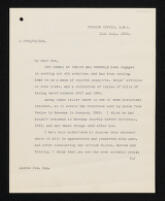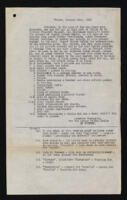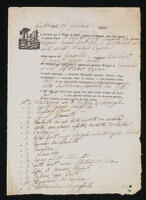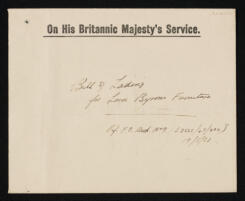The Lodge, St. John's College, Cambridge. - 'Thank you... for your memoir of Gaselee...
Dunmore, By Tarbert, Argyll. - 'Thank you so much for... your memoir of Gaselee'.
The Cloisters, Eton College, Windsor. - 'Thank you... [for] your account of Stephen Gaselee'.
Foreign Office, S.W.1.—Presents to Trinity College a bill of lading for the shipping of Lord Byron’s furniture, discovered among the archives of the British Consul at Venice.
—————
Transcript
FOREIGN OFFICE, S.W.1.
21st July, 1932.
L 3720/43/402.
My dear Gow,
Our Consul at Venice has recently been engaged in sorting out old archives, and has been sending home to us a mass of expired passports, ships’ articles or crew lists, and a collection of copies of Bills of Lading dated between 1817 and 1823.
Among these latter there is one of some historical interest, as it covers the furniture sent by Byron from Venice to Ravenna in January, 1820. I think he had himself returned to Ravenna shortly before Christmas, 1819, and had these things sent after him.
I have been authorised to dispose this document where it will be appreciated and preserved with care, and after considering the British Museum, Harrow and Trinity, I think that you are the most suitable people to {1} have it, if you want it.
I enclose a translation of it so that you may see its nature {3}. I think the last item the “small child’s bed” is rather pathetic as it doubtless belonged to little Allegra, who had been ill just before they left Venice.
I do not know whether you will find it necessary to consult anybody else before accepting this offer. I presume your Council does not meet in the long vacation, nor your Library Committee, but you can doubtless speak to the Master or Vice-Master about it, and if you tell me that you would like it, I will send it by registered post or bring it with me some week-end when I come to Cambridge.
Yours ever,
Stephen Gaselee
Andrew Gow, Esq. {2}
I feel that if it went to Harrow it might set the boys asking “But why did the poet go from Venice to Ravenna?”
—————
Typed, except the signature and the postscript.
{1} Typed as a catchword at the foot of the first page and repeated at the beginning of the next.
{2} Typed at the foot of the first page.
{3} It is unclear whether the translation accompanied the bill from Venice, or whether it was made in England by Gaselee himself or someone else.
(It is unclear whether this accompanied the bill of lading from Venice, or whether it was made in England by Gaselee himself or someone else.)
—————
Transcript
Venice, January 26th, 1820.
Embarked, in the name of God and under good auspices, one {1} and for all in this port of Venice by Mr. Richard Belgrave Hoppner, His Britannic Majesty’s Consul for account of Signor Milord Bajron, in the hold of the sailing ship named Divina Provvidenza, owner Francesco Ceolin, Austrian, to convey and consign in this present voyage, to the said Signor Milord Bajron the undermentioned and numbered goods, dry, entire, and well conditioned and of the numbers stated: and so the said Master promises to consign them on his safe arrival; and as freight there shall be paid to him in all eighteen Roman crowns, Crowns 18, and in proof thereof this, together with other similar (copies) shall be signed by the said Master, and if he shall be unable to write, a third person shall write for him, and only drawn up, the others being of no value.
No. 4 Mattresses, with 3 pillows and bolster.
” 1 Small padded bed cover.
(a) 2 Empty mattress cases.
(b) 4 Comodes—packed in matting
2 Footstools
1 Basket with various effects, covered in cloth.
1 Valise.
1 Bundle containing a bracket and other effects packed in matting.
1 Dining-room table.
1 Small table.
1 Filter.
4 Cases of printed books.
1 Case containing a plaster Statue.
(c) 1 Sofa of cherry wood.
4 Cushions for the above.
(d) 16 Small walnut chairs.
6 Small straw-seated arm chairs.
1 Caldron containing various effects.
2 Small wooden dog-kennels.
1 Bath tub.
(e) 1 Package containing a double bed and a small child’s bed, taken to pieces.
Lodovico Barbaglia,
for the Master Franco Ceolin as witness.
Notes:—
(a). It was usual at that time to stuff mattress cases with straw—hence the word “Pagliazzo”—(paglia—straw)—presumably the servants’ mattresses.
(b). Como stiorati—the latter word is probably derived from stiora or mat, and possibly they were cov-ered in matting. “Stiorati” a term which is used locally for “inlaid”.
(c). Sofa di Cevesar—this word is evidently Cereser—or the local dialect for cherrywood.
(d). “Careghe”, diminutive “Careghino”—Venetian for a chair.
(e). “Cocchietta”—mispelt† for “cocetta”—double bed. “Putello”—Venetian for child.
—————
1 single sheet.
{1} A slip for ‘once’?
{2} ‘aj’ possibly typed over other letters.
† Sic.
Travellers Club, Pall Mall, S.W.1 [but posted in Essex]. - Comments on Gaselee memoir.
Committee and officials listed on front cover: President of Committee, H. E. E. Howson; Committee, Dr. F. J. Foakes-Jackson and C. A. Elliott; Keeper of the Match Book and Secretary, H. W. A. Elliott; Steward of the Luncheon, S. Gaselle; Judge, G. G. G. Butler; Starter, P. C. Crick; Clerk of the Scales, A. F. Scholfield; Official Time Keeper, G. T. Lapsley.
'1. 45. The Decemviri Plate ( a catch-weight steeplechase) of half-a-crown each for starters, with twenty shillings added, for four years old and upwards; the second and third to save stake. Coton Course, five furlongs (12 entries). Closed Nov. 23, 1910.' List of horses and their owners, with colour and type, weight, and colours of jockey, for example: '1. Mr. S. Gaselee's b[ay] h[orse - i.e. stallion] BUCEPHALUS. Aged. 14 st. 1 lb. Scarlet'.
Venice.—Certifies that R. B. Hoppner, the British Consul, has embarked, on Lord Byron’s account, certain goods aboard the Divina Providenza, bound for Ravenna.
27 Dalkeith Avenue, Glasgow, S.1. - 'Your notice [?] of Gaselee arrived...'
(The envelope bears the printed words ‘On His Britannic Majesty’s Service’, and is labelled ‘Bill of Lading | for Lord Byrons Furniture | Ref. F.O. Desp. No 9. (L2523/43/402) | 19/5/32.’ This is presumably the envelope in which the bill was sent from Venice.)
The Master's Lodge, Trinity College, Cambridge. - 'I have just read your notice of Gaselee...'
Tilton, Firle, Lewes. - 'I have been reading... your Memoir of Stephen Gaselee. But alas you have copied the mistake... in the Cambridge Review....
35 Gilston Road, S.W.10. - 'Mr Mullins and Mr Hinton have each received your Memoir of S.....
The Institute for Advanced Study, School of Humanistic Studies, Princeton, New Jersey. - 'I have just read your account of Gaselee...'.
Photocopy of a letter dated 8 Jan. 1915
Housman, Alfred Edward (1859-1936), poet and classical scholarGreat Hundridge Manor, Great Missenden, Bucks. - 'Thank you... for the article on Gaselee'.
H5, Albany, Piccadilly, W1. - 'Thanks... for sending me your Memoir of Stephen Gaselee...'
The Master's Lodge, Selwyn College, Cambridge. - 'I took Gaselee on a train to London...'.
Asks Scholfield to consult the Council of Trinity to find out what they want to be done about the catalogue of early printed books at Trinity with which Gaselee was engaged for a few years before the war.
Foreign Office. - 'I have read your article on Augustan diminutives...'
Eton College, Windsor. - 'Many thanks for your monograph on Stephen Gaselee...
Mentions news of Stephen Gaselee and Bruce Rogers.
100 Holywell, Oxford. - '... I enjoyed your account of Gaselee...'
Flendyshe, Fen Ditton, Cambridge. - 'rejected [?from the army] on the grounds of a weak heart... Stephen Gaselee has gone to the Foreign Office'.
Flendyshe, Fen Ditton, Cambridge. - '...thanks for the separate copy of your studies on Hesiod... Gaselee is being married'.
Trinity College, Cambridge. - 'Your Gaselee... is perfect...'



